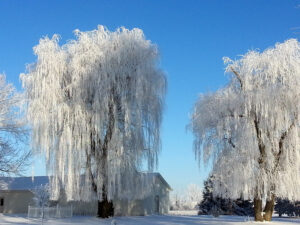 We had our first killing frost last week, a full month later than usual in Goochland County. We did not, however, have hoarfrost.
We had our first killing frost last week, a full month later than usual in Goochland County. We did not, however, have hoarfrost.
The word “hoary” sounds ancient, and as we shall see, it became related with being ancient or, nowadays, overused and hackneyed. Go back far enough, and we have the Old English har, meaning old, venerable, or gray.
My recent post about garden hermits touched upon one aspect of hoariness: the “ornamental hermits” of wealthy landowners in Georgian England were expected to wear long white beards. The facial hair and their owners get described as “hoary” by many visitors to the garden hermitages.
We can see from The Merriam-Webster Dictionary’s slew of definitions that “white with age” comes up again and again with our word, though more recently, “hackneyed” or “worn out” have taken pride of place.
As for “hoarfrost”? We rarely see it in Virginia, though during a few very cold Indiana winters when I was in graduate school, it occurred from time to time. I’d get up before dawn in hunting season to see wire fences and branches festooned with long streamers of frost.
This article provides a nicely written overview and some amazing images of the phenomenon, often occurring near bodies of water, when on “cold, clear, and windless nights with low humidity, when the rapid radiant heat loss from surfaces causes water vapor–not liquid water droplets, as in fog–to form delicate, needle-like crystals on those surface.”
I adore cold weather. I could look at that writer’s images of frost all day long. Florida is for the rest of you. Bring on the hoarfrost.
I hope your holidays are warm (indoors) and seasonal (outside). The blog, full of words hoary and new, will continue all winter and into the months I don’t like so well.
Please send useful words and metaphors to me at jessid -at- richmond -dot- edu or by leaving a comment below. See all of our Metaphors of the Month here and Words of the Week here.
Image: LadyDragonfly at Flickr